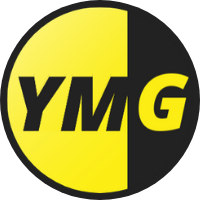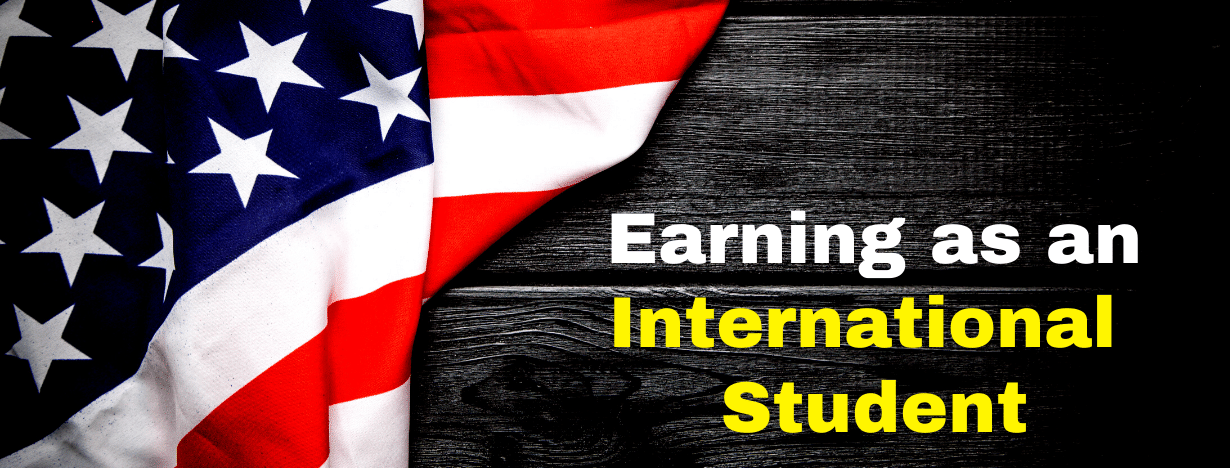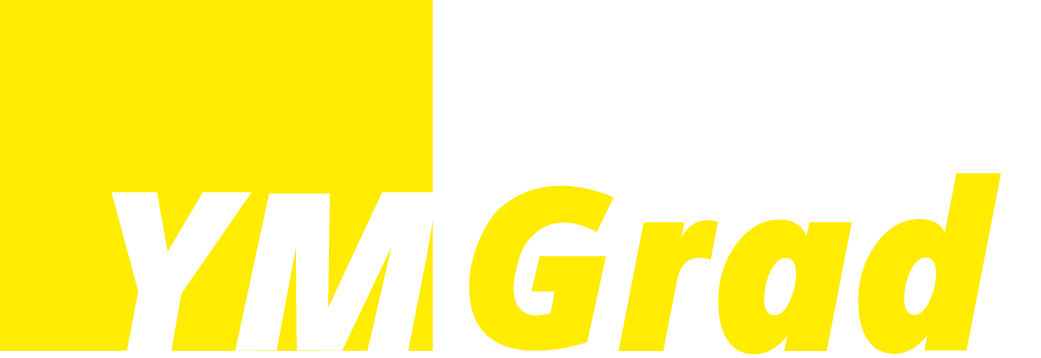The No. 1 way to earn while studying in USA


You are bound to have a tough time managing your finances as an international student in the United States given the sky-high study costs and living expenses that it entails. Grappling with the bills and paying fees can lead you into a stressful situation. It can be even more challenging if you never had to manage your expenses before in life.
On top of that, the U.S. student visa, better known as the F-1 visa imposes a wide range of restrictions over working as an international student.
Hold your horses, there is always a way out no matter how hard the situation gets.
Keep reading to learn all the legal ways that can help you generate an extra income that will take care of your bills.
The most important requirement to benefit from any of the following initiatives is to have an F-1 visa status.
Before jumping into the best way to earn as an international student in USA, let's explore the other options first.
On-Campus Employment
The best part of on-campus employment is you become eligible for it right from the day your program begins. Also, if you want to start working from your first year, this is the only option you will have.
You can work for up to 20 hours per week while taking courses and 20-40 hours per week during vacations.
On-campus employment does not require approval from the U.S. Citizenship and Immigration Services (USCIS) unlike the other options that you will find below.
One downside of on-campus employment is you have to compromise with the wages unless you are an experienced professional. You can earn $8-$12 per hour which may vary from state to state.
CPT
Curricular Practical Training (CPT) is exclusively available for the students who are pursuing a degree where it is absolutely necessary to opt for it to ensure program completion.
Although your CPT fetches you extra academic credits, you have to complete it before graduation. Also, It should be directly related to your area of study since the purpose of CPT is to offer practical experience pertaining to your course.
You are not allowed to apply for CPT if you haven't been enrolled full-time for at least one year at your university.
To register for CPT, you need to get your application approved by USCIS and you will need a job offer beforehand in this case. Changing your job can be difficult since you will have to go through the whole process of getting your CPT approved again.
You can work up to 20-40 hours per week in this case for a 12-month period.
Working for more than 20 hours per week means working full-time. Never make the mistake of working full-time for an entire year because it will exhaust your OPT. However, if you do not wish to opt for OPT, feel free to do it.
Like what you see? Subscribe to our newsletter to receive such content regularly. Sign Up to unlock UniPredict and receive Sample SOPs, LORs, Free GRE Study Material, Practice Questions and more delivered straight to your email.
OPT
Optional Practical Training (OPT) is valid for 36 months for STEM-designated programs and for 12 months otherwise.
Like CPT, you won't be eligible for OPT either if you haven't been enrolled full-time for at least one year at your university. Also, it should be directly related to your area of study in this case as well.
You need to apply for it before your degree completes and it can take up to 90 days for it to get approved. The earliest date you should apply for an OPT must be 90 days prior to your program completion. Another point to bear in mind is that your OPT must begin within a period of 60 days after you have graduated.
Working for part-time counts as full-time, meaning, if you were working for less than 20 hours a week for 4 months, then it will translate to 2 months of full-time work.
To register for OPT, you need to get your application approved by USCIS and you don't need a job offer beforehand for it. Changing employers is easier in the case of OPT because it doesn't require getting a new approval from USCIS.
The No. 1 way to earn as an international student in the States
Now that you have seen all the other methods to acquire employment with F-1 visa status, here's the bonus point that will help you work as an international student without exhausting either of your CPT or OPT.
It is Employment with an International Organization!
This is a type of employment authorization for F-1 students who grabbed an internship with recognized F-1 international organizations like the World Bank, and International Monetary Fund.
You will be eligible for this if you received an internship offer from any of the recognized international organizations.
The application process involves obtaining an International Center recommendation in the form of a new I-20 and then, getting approval from USCIS.
First you need to submit your application for a new I-20 to the International Center through an appointment with an international student/scholar advisor. The processing time takes up to 2 weeks and if you are found eligible, you will receive an updated SEVIS I-20 with a recommendation for international organization employment.
Followed by that, you must apply to USCIS by filing Form I-765, which is an application for employment authorization. This will fetch you an Employment Authorization Document (EAD) which can take up to 4 months of processing time. Receiving approval from USCIS will grant you an EAD card that will officially give you permission to work at an International Organization.
Here's a list of the organizations you can work in with your EAD:
American institutions of research, public international organizations, and designations under the International Immunities Act.
| African Medical and Research Foundation (AMREF-USA). |
| Albert Einstein College of Medicine of Yeshiva University (only in relationship to its research programs). |
| American Friends of the Middle East, Inc. |
| American Institutes of Research in the Behavioral Sciences (only in relationship to research projects abroad). |
| American Universities Field Staff, Inc. |
| American University, The, Cairo, Egypt. |
| American University of Beirut (Near East College Associations). |
| Arctic Institute of North America, Inc. |
| Armour Research Foundation of Illinois Institute of Technology. |
| Asia Foundation, The (formerly Committee for a Free Asia, Inc.). |
| Association of Universities for Research in Astronomy (AURA, Inc.), Tucson, AZ. |
| Atomic Bomb Casualty Commission. |
| Beirut University College. |
| Bermuda Biological Station for Research, Inc. |
| Bernice P. Biship Museum of Polynesian Antiquities, Ethnology and Natural History at Honolulu, HI. |
| Brookhaven National Laboratory, Associated Universities, Inc. |
| Brown University (Department of Engineering), Providence, RI. |
| Buffalo Eye Bank and Research Society, Inc. |
| Burma Office of Robert N. Nathan Associates, Inc. |
| California State University at Long Beach, Department of Geological Sciences. |
| Carleton College (Department of Sociology and Anthropology), Northfield, MN. |
| Center of Alcohol Studies, Laboratory of Applied Biodynamics of Yale University. |
| Central Registry of Jewish Losses in Egypt. |
| College of Engineering, University of Wisconsin. |
| College of Medicine, State University of New York. |
| Colorado State University (Research Foundation), Fort Collins, CO. |
| Colorado University (International Economic Studies Center), Boulder, CO. |
| Columbia University (Parker School of Foreign and Comparative Law) and (Faculty of Pure Science), New York, NY. |
| Cornell University (International Agricultural Development, University of the Philippines-Cornell University Graduate Education Program). |
| Dartmouth Medical School. |
| Department of French, Department of Scandinavian Languages, and Department of Near Eastern Languages of the University of California, Berkeley, CA. |
| Duke University. |
| Environmental Research Laboratory of the University of Arizona. |
| Fletcher School of Law and Diplomacy, Medford, MA. |
| Ford Foundation, 477 Madison Avenue, New York, NY. |
| Free Europe, Inc. (formerly Free Europe Committee, Inc.; National Committee for a Free Europe (including Radio Free Europe)). |
| Georgetown University. |
| George Williams Hooper Foundation, San Francisco Medical Center, University of California, San Francisco, CA. |
| Gorgas Memorial Institute of Tropical and Preventive Medicine, Inc., and its operating unit, the Gorgas Memorial Laboratory. |
| Graduate Faculty of Political and Social Science Division of the New School for Social Research, New York, NY. |
| Harvard University (research and educational programs only) |
| Harvard-Yenching Institute. |
| Humboldt State University, School of Natural Resources, Wildlife Management Department. |
| Indiana University at Bloomington, Indianapolis, South Bend, Northwest, Kokomo, Southeast, East, and Fort Wayne |
| Institute for Development Anthropology, Inc. |
| Institute of International Education, Inc. |
| Institute of International Studies, University of California, Berkeley, CA. |
| International Center for Social Research, New York, NY. |
| International Development Foundation, Inc. |
| International Development Services, Inc. |
| International Research Associates, Inc. |
| Inter-University Program for Chinese Language Studies (formerly Stanford Center for Chinese Studies) in Taipei, Taiwan. |
| Iowa State University. |
| Iran Foundation, Inc., The. |
| Kossuth Foundation, Inc., The, New York, NY. |
| Louisiana State University. |
| Massachusetts Institute of Technology. |
| Michigan State University, East Lansing, MI. |
| Missouri Botanical Garden (research and educational programs only) |
| Natural Science Foundation, Philadelphia, PA. |
| New York Zoological Society. |
| Paderewski Foundation, Inc. |
| Peabody Museum of Natural History of Yale University. |
| People to People Health Foundation, Inc., The (only in relationship to the scientific research activities that will be carried on abroad by the medical staff of the SS “Hope”). |
| Pierce College (in relationship to research by an instructor, Department of Psychology), Athens, Greece. |
| Population Council, The, New York, NY. |
| Radio Liberty Committee, Inc. (formerly American Committee for Liberation, Inc.; American Committee for Liberation of the Peoples of Russia, Inc.; American Committee for Liberation from Bolshevism, Inc.). |
| Rockefeller Foundation. |
| Rutgers University, the State University of New Jersey |
| School of International Relations of the University of Southern California. |
| SIRIMAR (Societa Internazionale Recerche Marine) Division, Office of the Vice President for Research, Pennsylvania State University. |
| Social Science Research Council. |
| Solar Energy Research Institute (SERI). |
| Stanford Electronic Laboratories, Department of Electrical Engineering, School of Engineering, Stanford University, Stanford, CA. |
| Stanford Research Institute, Menlo Park, CA. |
| Stanford University (the George Vanderbilt Foundation), Stanford, CA. |
| Syracuse University. |
| Tulane University Graduate School. |
| Tulane University Medical School. |
| University of Alabama. |
| University of Alabama Medical Center. |
| University of Chicago (as a participant in the International Cooperation Administration Program No. W-74 only). |
| University of Colorado (Department of History), Boulder, CO. |
| University of Connecticut, College of Liberal Arts and Science (Department of Germanic and Slavic Languages). |
| University of Hawaii, Honolulu, HI. |
| University of Ilinois at Urbana-Champaign, Austria-Illinois Exchange Program. |
| University of Kansas, Office of International Programs. |
| University of La Verne (La Verne College of Athens) |
| University of Michigan (School of Natural Resources), Ann Arbor, MI. |
| University of Minnesota, Department of Plant Pathology (in relationship to research project abroad). |
| University of Nebraska Mission in Columbia, South America. |
| University of North Carolina at Chapel Hill. |
| University of Notre Dame, Notre Dame, IN. |
| University of Puerto Rico. |
| University of Washington (Department of Marketing, Transportation, and International Business) and (The School of Public Health and Community Medicine), Seattle, WA. |
| Wayne State University, Detroit, MI. |
| Wenner-Gren Foundation for Anthropological Research, Inc. |
| Williams College, Economic Department, Williamstown, MA. |
Public international organizations of which the United States is a member by treaty or statute
| The North Atlantic Treaty Organization. |
| United Nations and all agencies and organizations which are a part thereof. |
International Organizations Immunities Act designation
| African Development Bank (E.O. 12403, Feb. 8, 1983). |
| African Development Fund (E.O. 11977, Mar. 14, 1977). |
| Asian Development Bank (E.O. 11334, Mar. 7, 1967). |
| Caribbean Organization (E.O. 10983, Dec. 30, 1961). |
| Criminal Police Organization (E.O. 12425, June 16, 1983). |
| Customs Cooperation Council (E.O. 11596, June 5, 1971). |
| European Space Research Organization (ESRO) (E.O. 11760, Jan. 17, 1974). |
| Food and Agriculture Organization, The (E.O. 9698, Feb 19, 1946). |
| Great Lakes Fishery Commission (E.O. 11059, Oct. 23, 1962). |
| Inter-American Defense Board (E.O. 10228, Mar. 26, 1951). |
| Inter-American Development Bank (E.O. 10873, Apr. 8, 1960). |
| Inter-American Institute for Cooperation on Agriculture (E.O. 9751, July 11, 1946). |
| Inter-American Statistical Institute (E.O. 9751, July 11, 1946). |
| Inter-American Tropical Tuna Commission (E.O. 11059, Oct. 23, 1962). |
Related Posts
USA vs Canada vs UK: Best country to Study Abroad
Must have documents for F-1 Visa Interview
How to find student housing in the US?
If any of the above points were unclear to you, feel free to watch this video to dispel all your doubts.








